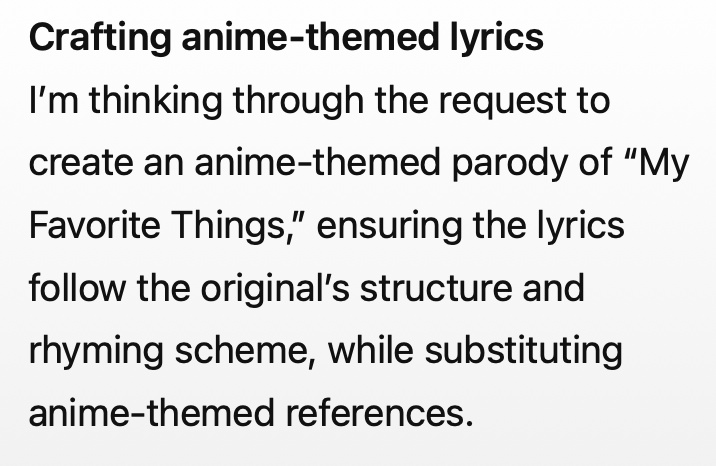Computers
Fixes and workarounds
Finally!
Windows 11 no longer reboots when you tell it to update-and-shutdown. The problem affected Windows 10 as well, so it’s been busted for ten years, neatly highlighting Microsoft’s QA priorities. Which somehow seem to involve cramming more ads, AI, and privacy violations into every product.
Oh, joy, more work for me!
My parents have a Windows 10 PC that they were worried about not being able to upgrade as the OS falls out of support. Last week, I got a call asking me to come over and fix its sudden inability to print, which involved deleting and reinstalling the printer driver. Odd, but hey, it’s Windows.
Except that there were more problems, like the fact that left-clicking the Start button did nothing, the taskbar Search field did nothing, and right-clicking the start button to launch Settings popped up an error dialog. I didn’t have a lot of time, so I screenshotted everything and went off to research fixes, which included some partially successful incantations.
Then I discovered what was really going on: it had silently upgraded itself to Windows 11. Mostly. So now I need to copy a recovery image to a USB stick and head back over there soon to repair or re-run the upgrade. Sigh.
(I’ve got half a dozen Windows PCs around the house that I would be happy to upgrade to Win11, but I can’t; several are old enough that the CPUs simply aren’t supported, so even the workarounds won’t work around, and one couldn’t run Linux or BSD for blood or money, due to proprietary drivers required for major components)
Python drag-and-drop wrapper for py2app
Turns out that Automator isn’t entirely scriptable, which seems like an obvious oversight, but Apple probably couldn’t figure out how to monetize those pixels. Instead, I updated the build script for my gallery-wall app (not yet uploaded to Github) to use Platypus, not to be confused with Python Platypus.
cat > _rungallery.sh <<'EOF'
#!/bin/zsh
exec open -a "gallerywall_backend" --args "$@"
EOF
chmod +x _rungallery.sh
platypus -a "Gallery Wall" \
--interface-type None \
--droppable \
--quit-after-execution \
--bundle-identifier "org.dotclue.gallerywall" \
--author "J Greely" \
--app-version "1.0.0" \
--app-icon images/GalleryWall-wrapper.icns \
--interpreter "/bin/zsh" \
_rungallery.sh
(the downside is that it makes apps that won’t run on a nailed-down-by-default Mac, and in fact you can’t even install Platypus on most Macs, due to code-signing errors that are supposed to be fixed in the next release)
My AnimAI Things
I posed the usual challenge to ChatGPT’s o1-mini model: “write an
anime-themed parody of the song ‘My Favorite Things’”. It spent about
twenty minutes claiming:

Then it timed out and gave up. When I asked it to try again, it quickly tossed off some generic anime-ish doggerel. When I asked it to do what it claimed it was working on, it pulled the usual “network connection was lost” dodge (ChatGPT’s way of saying “fuck off, kid, I’m not listening”).
I knocked it down to the older 4o model, fed it the original request
plus the clause that o1-mini had claimed it was working on, and it
instantly produced something that mostly fit. Not as good as
mine, of course, but this is the first LLM
I’ve tried that’s actually made a credible attempt at it:
“My Favorite Anime Things”
(To the tune of “My Favorite Things”)Magical girl squads with powers and sparkle,
Sword-wielding heroes in battles so martial,
Titans that crumble when teamwork takes wings,
These are a few of my anime things.Villains who monologue, plans all revealing,
Big-eyed emotions, the depth of the feeling,
High school confessions and friendship that clings,
These are a few of my anime things.Giant robots that crash through the skyline,
Fox-eared companions who offer a lifeline,
Power-up moments where destiny rings,
These are a few of my anime things.Chorus:
When the plot twists,
When the ships sink,
When I’m feeling sad,
I simply remember my anime things,
And then I don’t feel so bad.Ramen so steaming it melts all my sorrow,
Training arcs promising strength for tomorrow,
Cherry trees blooming while soft music sings,
These are a few of my anime things.Portals to worlds where the stakes are much higher,
Epic showdowns with explosions and fire,
Kawaii mascots with angelic wings,
These are a few of my anime things.
Now, how does the currently-trendy offline model Qwen2.5-32B do?
(the “B”, by the way, is a rough estimate of the model’s size and complexity, and, to a first approximation, the amount of VRAM your graphics card will need in order to produce output at a decent rate. My card has only 24GB, but I used a “quantized” version of the model that was only 20 GB on disk; I can get sluggish responses from a quantized “70B” model, but the top-of-the-line “123B” models constantly swap data between RAM and VRAM, producing nothing)
“I speak IPv6 to my Windows”
…and take it over completely. Patch time!
Dear Apple,
It would be really nice if DNS worked. Here we are, nearly a quarter
of the way through the 21st century, and I’ve still got to
periodically run a command-line tool to flush stale DNS entries that
prevent simple functionality like, say, connecting to Gmail’s IMAP
servers. (sudo killall -HUP mDNSResponder, that is)
Of course, with how often iCloud mail randomly goes offline, maybe you just don’t know if email breaks…
Totally different show…
Every time I see mention of this season’s Pseudo Harem, I find myself thinking it would be better as a hentai titled Sudo Harem, involving one of those brainwashing smartphone apps that constantly turn up in consent-free fan-art and games.
It lives…kinda!
Monotype killed off FontExplorer X Pro so completely that the final version they shipped crashes constantly on the last two releases of MacOS. The primary long-time competitor, Suitcase, went full-on with mandatory monthly subscriptions and The Cloud, which, fuck ’em.
A popular cross-platform alternative (with no support at all for legacy font formats), Fontbase, is free for basic use, but charges $3/month for… slightly-less-basic use. I don’t think anyone involved has ever had a large collection of fonts, or even been in the same room with a copy of Font Explorer X Pro. In fact, the only current non-monthly-fee alternative that does have a useful feature set is Typeface, which is… Mac-only.
(FontAgent doesn’t have a monthly fee, but also hasn’t actually implemented some features fully, like “being able to correctly count the number of glyphs in a font”)
Anyway, if you have a license and find a copy of FontExplorer X Pro 7.3.0, and you’re very quick, you can get the Preferences window open and shut off all attempts to connect to servers for updates, the store, etc. It still doesn’t actually work under Sonoma, but you can export all your configs and collections, and manually import them into another font manager. If you can live with the Mac-only thing, Typeface will import everything directly, including all the organization you may have done.
(okay, the connection between poor font-management and collecting the whole set of Molesting Magical Girls heroines in their “SM Big Thanksgiving” form is weak, but so am I)
And I’m thinking about font managers because…
Since Reportlab only handles Type 1 and TrueType, I needed to sort
through all my fixed-width fonts and figure out which ones were
compatible, so I could test uc2p with a decent variety. I wanted to
gather up all the coding fonts I collected and
tested several years ago, and they’re all
in FEX, which has been crashing since I upgraded to a non-Intel Mac
running the current MacOS.
At this point, I’ve pretty much decided that I’ll bundle IO Terminal with the script to guarantee that anyone who downloads it will have at least one known working font, but I’d like to list alternatives, and file some bugs for the problems I’ve seen.
“There's no I in AI...”
S-Rank Daddy’s Girl, episode 11
You’re not going to believe this, but Our Homesick Daughter was packing up for a fall visit home when suddenly guild business delayed her long enough for winter to completely cancel the trip. Unpossible, amiright?
For safety’s sake, she leaves The Trouble Twins with her gal-pals, which is sure to trip a few flags, but fortunately Our Haunted Dad has decided to finally face his past and seek out his old adventuring friends, so he wouldn’t have been home anyway.
Meanwhile, one of said friends is haunted by his own memories from those days, killing time in the county jail by cadging booze from little girls in exchange for adventuring stories.
Verdict: Our Best Catgirl in a clingy dress? Sold! The problem is, we’ve only got two episodes left, and there are a lot of balls in the air. Are they going to awkwardly wrap it up or try for a second cour?
(wrong catgirl, but she’ll do in a pinch)
Frieren, episode 14
In which love is in the air. Literally. Also, Himmel was a sly dog.
Verdict: Pouty Fern! Happy Fern! Sneaky Frieren! Smiley Frieren!
Gate manga, volumes 7-9
These (7, 8, 9) quietly slipped out on November 30, so they’ve slowed the release pace quite a bit, but haven’t stopped. Spiffy.
Unrelated,
Homebrew’s decision to move everything from /usr/local to
/opt/homebrew got even more annoying when neither Perlbrew nor Plenv
could successfully build XS modules with internally consistent
libraries. When I started working through the issues with SVG and
Pango in PDF::Cairo, I ended up with a busted install that would try
to mix the libgtk from Homebrew with an older libglib that it found
somewhere in the file system. Apparently instead of having
predictable (if often insecure) library-path environment variables,
MacOS has gone to a caching system where the first copy found wins,
non-deterministically; the suggestions I’ve found mostly require
scrubbing the disk of all duplicate libraries (I count at least 13
copies of libglib, most of them embedded in apps), deleting the cache,
and rebooting.
So for now I’m installing all modules directly into Homebrew’s perl,
and re-installing all of them every time there’s a minor version
update (local::lib currently isn’t playing well with Homebrew’s perl
at the moment, either, sigh). I haven’t had the time to completely
untangle everything yet, because Christmas prep and job interviews
have first pick of my brain cells.
(Oh, have I failed to mention the job-hunting? Yeah, someone thinks half of my team can be replaced with new hires at the Prague office. Magic 8-Ball says “good luck with that”)
Dear Llama-2-7B-chat (MLX),
Don’t quit your day job:
“tell me a story about catgirls” (5000 tokens)
(note: the mlx-example script defaults to a constant seed, so that the output is repeatable; if you like what you get, you can simply repeat it with a larger number of tokens)
rust.waaaaambulance();
The entire Moderation Team for the Rust programming language has resigned. This came as a surprise to everyone who didn’t know that Rust had a moderation team, or what it was contributing to the development of the language.
The answer is, of course, Toxic CoC Syndrome:
Remarks that moderators find inappropriate, whether listed in the code of conduct or not, are also not allowed.
In other words, “we’re the Tone Police, and whatever we say goes”.
Also:
And if someone takes issue with something you said or did, resist the urge to be defensive. Just stop doing what it was they complained about and apologize. Even if you feel you were misinterpreted or unfairly accused, chances are good there was something you could’ve communicated better — remember that it’s your responsibility to make your fellow Rustaceans comfortable.
So if someone says “your pull request is worthless garbage that breaks the build”, they are required to apologize and stop harassing you over your earnest desire to decolonize the language by renaming all problematic functions.
For more fun, this CoC incorporates by reference the “Citizen Code of Conduct”, which includes this hilarious little gem:
No weapons will be allowed at [COMMUNITY_NAME] events, community spaces, or in other spaces covered by the scope of this Code of Conduct. Weapons include but are not limited to guns, explosives (including fireworks), and large knives such as those used for hunting or display, as well as any other item used for the purpose of causing injury or harm to others.
Since the “covered spaces” of the Rust-y CoC primarily consist of Discord channels, online forums, and git checkins, I’m assuming they’re referring to weaponized emoji here:
🥢 👞 🧀 🗡 🏓 🔞 🚔 🧸 🥋 🌂 🔩 🧫 🤺 🛁 🎛 ⛏ 🥩 🇺🇸 🥓 🪓 ©️ 🧨 🔪 🛑 🖋 🧷 🏏 💤 🏒 ⚠️ 🔧 🥊 💣 ⚓️ 🗑 🧼 🧻 🔨 🛂 🔫 🦨 🙈 🙉 🙊
Massive hole in Ghostscript
I’m amused to see Ghostscript described as a small library, but deeply annoyed that a critical “run arbitrary code on your machine” vulnerability disclosed sometime last year is still unfixed, despite it having been verified and bug bounties paid out.
The new proof-of-concept exploit is only 20 lines of Python.
Since it’s embedded in all sorts of software, you may not know that you’re affected by this hole, or for how long you’ll be vulnerable. All it takes is for something in your daily workflow to decide to render a downloaded SVG file via GS.
Router Promiscuity
My home router (an old Shuttle running OpenBSD 6.3) went down due to bad blocks on /var. I had recent backups, but my cold spare still had a 5.x install on it, so after manually fscking the old machine enough to get it back online for the day, I downloaded a fresh copy of OpenBSD 6.9, installed it, copied over all the config files, and swapped it into place.
It didn’t work. More precisely, everything worked except sending traffic out the public interface to the Internet. I couldn’t reach the gateway. I could ssh into the router from my laptop over the private interface just fine, though.
Thinking perhaps that I’d outsmarted myself by trying to preserve the MAC address of the old server to deal with the common cable-modem issue of fixating on a specific MAC, I removed that clause from the config and rebooted both router and modem.
That didn’t help, so I fired up tcpdump on the public interface to
see if there was anything showing up at all, and everything started
working fine.
Kill tcpdump, packets stop. Start it back up, packets flow. In other words, everything works perfectly as long as the public interface is in promiscuous mode. This isn’t one I’ve run into before in my 15-ish years of managing OpenBSD routers, or even the 6 years I’ve owned this Shuttle DS61.
I’m going to have to swap a new SSD into the other router (identical
hardware), install the same configs, and do some testing. Which is a
lot easier if I’m online, so for now, /etc/rc.local contains:
nohup tcpdump -n -i re0 -w /dev/null icmp &
Dear Adobe,
The experience of being suddenly forced to shutdown Lightroom in the middle of an editing session because you decided that I wasn’t logged into your Clown service any more is sub-optimal. Also a pretty good way to encourage customers to stop paying you a monthly fee and look elsewhere for software.
Just sayin’…















